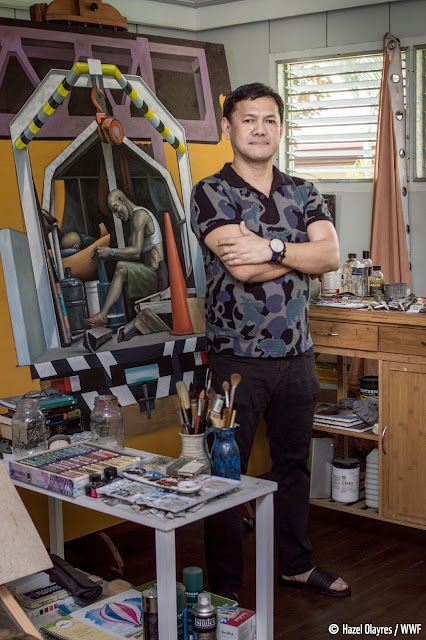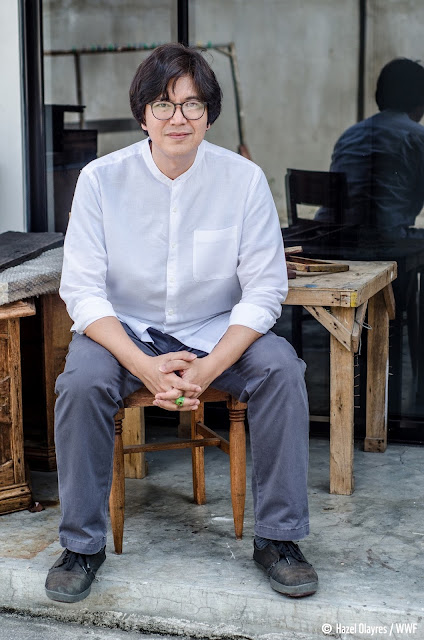May 6, 2022
WWF Ambassadors Pia Wurtzbach and Jeremy Jauncey champion WWF-Philippines’ Build Back Better campaign for Bicol fishing communities
October 23, 2020
WWF Continues to Fight Against Plastic Pollution, Advocates for an Extended Producer Responsibility Scheme in the Philippines
WWF-Philippines launched a study about the Extended Producer Responsibility (EPR) system that will implement the basic principles of a collective responsibility in waste management, from collection and sorting to recycling and recovery.
Plastic pollution has reached gigantic dimensions worldwide and has caused serious consequences to marine life and the well-being of society. In a recent study, it has been estimated that about 11 million tonnes enter the ocean every year. If no action is made, this can triple by 2040 which is equivalent to 50 kg of plastics for every coastline meter worldwide.
The Philippines, based on 2015 modelling the study has been considered as one of the 10 top countries contributing to plastic pollution, has been continuously challenged with increasing waste generation and the lack of a sound waste management system. This calls for a comprehensive approach among policymakers, corporations, cities, and consumers to ensure that no plastics reaches nature.
 |
Snapshots from a recycling facility in Quezon City, taken during a field visit last February 2020
Photograph ©Czarina Constantino / WWF-Philippines |
Building on its No Plastics in Nature initiative, the World Wide Fund for Nature (WWF) Philippines releases a report entitled “Extended Producer Responsibility (EPR) Scheme Assessment for Plastic Packaging Waste in the Philippines”. This report, undertaken with cyclos GmbH and AMH Philippines Inc, highlights EPR as a critical and effective policy tool in holding manufacturers accountable for the end-of-life impacts of their plastic products and packaging. EPR as a policy instrument also encourages the adoption of holistic eco-design among the business sector. The proposed EPR scheme has been based on the findings of the first Material Flow Analysis of plastic packaging waste in the Philippines.
The report shows that Filipinos consume the yearly average of 20kg of plastics, from which 15.43kg/cap/year becomes waste. Insufficient recycling capacities for high-value recyclables (i.e. PET, PP, HDPE) and the high volume of low-value plastics (including sachets) are factors that affect the country’s low plastic recycling rate, at 9%. The report further estimates that the Philippines leaks about 35% of plastic wastes into the environment.
These waste reduction and management
conditions shaped the proposed customized EPR scheme in the Philippines. It
proposes a mandatory EPR scheme for all product packaging with a three-year
transition phase for obliged businesses to redesign their product packaging and
eliminate unnecessary plastics. For this customized EPR scheme to work, the
report emphasizes that the responsibility of implementing the scheme for
building high-quality recycling capacity should be assumed by a non-profit
Producer Responsibility Organization (PRO), acting as the system operator, with
strict monitoring and control systems carried out by the government.
A key first step is a clear, effective, and unambiguous legal framework towards EPR. This can only happen if policymakers take a bold and decisive step to put this globally recognized waste reduction and management scheme in place. A legal framework for EPR should outline clear objectives, responsibilities, enforcement mechanisms, and a timeline for implementation and targets. The effectiveness of the EPR system relies on the active role of the government to regulate and supervise the system and its operator through a legal framework. This is also aligned to the ASEAN Framework of Action on Marine Debris that enjoins member states like the Philippines to develop and implement EPR policies and schemes.
Facilitating partnerships among relevant stakeholders, most notably the government and the private sector, WWF-Philippines advocates for the adoption of the EPR scheme in the country to stop plastic pollution.
“Addressing plastic pollution requires both upstream (production/pre-consumption) and downstream measures (consumption and post-consumption). Working on the entirety of the plastic life cycle, stakeholder collaboration is important in both reducing the production and the consumption of unnecessary plastic, and also in managing plastic products and packaging, ensuring that materials are used as long as possible in our society,” says Joel Palma, WWF-Philippines’ Executive Director.
Nestlé Philippines, one of the leading producers of fast-moving consumer goods (FMCG) in the country, encouraged fellow stakeholders to do their part for nature by supporting the localized EPR scheme.
“At Nestlé, we believe that tackling plastic waste cannot be successfully achieved by a single or linear solution. It requires the attention and action of different stakeholders. We must look into different options both upstream and downstream, and take a holistic approach as we continue accelerating our initiatives to tackle plastic waste and EPR is a major instrument. We support the creation of a localized EPR scheme that we believe can help increase collection and recycling rates. We cannot achieve this alone, we must work together, to achieve a waste-free future," says Arlene Tan-Bantoto, SVP and Head of Corporate Affairs and Communications of Nestlé Philippines.
The study is part of the No Plastic in Nature Initiative - WWF’s
global initiative to stop the flow of plastics entering nature by 2030 through the elimination of unnecessary plastics, doubling reuse, recycling and recovery,
and ensuring remaining plastic is sourced responsibly. Through this initiative,
WWF-Philippines has been working with cities on plastic leakage, policymakers
to advocate for a global treaty on plastic pollution, businesses to transition
to circular business models, and the general public to campaign and act.
Take part to #ChangeTheEnding for our planet and help work towards a vision of no plastics in nature.
March 12, 2019
Earth Hour Philippines 2019 shines a light on plastic pollution
October 19, 2018
WWF-Philippines, Ayala Malls, and partners launch #AyokoNgPlastik movement to work towards a future without harmful plastic
 |
| Mariana Zobel de Ayala, Ayala Malls Deputy Head |
 “We’re very happy to see the growing number of people interested in beach cleanups. Now the challenge we must all take is to go beyond the beach and do whatever it takes to reduce our own carbon footprint,” Fernandez said.
“We’re very happy to see the growing number of people interested in beach cleanups. Now the challenge we must all take is to go beyond the beach and do whatever it takes to reduce our own carbon footprint,” Fernandez said. September 28, 2018
Hamilo Coast & WWF: Nurturing a Sustainable Partnership
The Philippines ranks third in plastic pollution in terms of dumping plastic into our oceans. This is largely caused by inefficient waste disposal in the country and poor awareness of the problem. Because of this, the World Wide Fund for Nature (WWF) Philippines, has been closely involved in coastal cleanups and other initiatives around the country to instill the importance of tackling this issue.
Acknowledging that everything that happens on the ridge has a direct effect on the reef, WWF-Philippines and Hamilo Coast continue to implement programs for its Ridge to Reef Management. This includes the declaration of Hamilo Coast’s three coves into Marine Protected Areas (MPAs) – Pico de Loro and Etayo coves, and Hamilo Coast’s main marine sanctuary, Santelmo Cove, where giant clams are being cultivated and a vibrant marine life thrive. Ongoing projects to protect coastal and terrestrial resources include mangrove reforestation, pawikan conservation, marine mammal rescue, and reef monitoring.
September 2, 2018
Pasig City Named Philippine Winner of WWF’s One Planet City Challenge 2018
April 27, 2018
With Visual Art Ambassadors, WWF Ph Opens Exhibit - "Art, Heart, Earth"
 |
| BenCab |
 |
| Elmer Borlongan |
 |
| Geraldine Javier |
















































